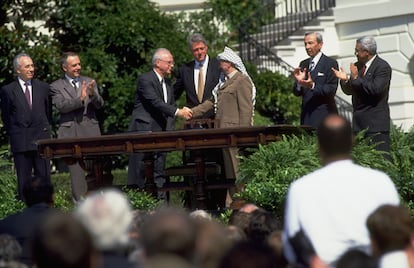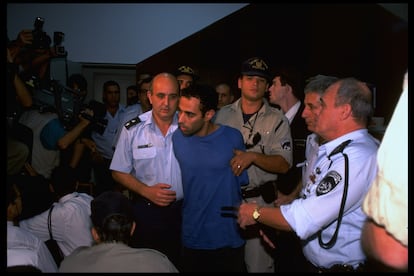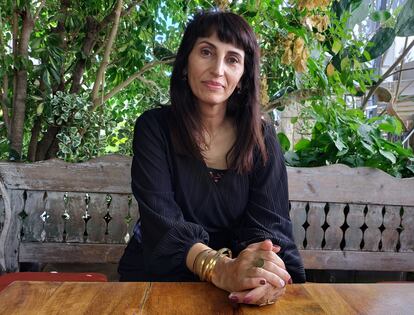Thirty years after the Oslo Accords, no one talks about peace in Israel and Palestine
Israelis and Palestinians have ignored an anniversary that is now associated with the failure and assassination of Prime Minister Yitzhak Rabin. The hopes raised by the pact have evaporated

In November 1995, Israel’s then-Prime Minister Yitzhak Rabin organized an event in Tel Aviv in defense of the Oslo Accords he had reached two years earlier with the Palestinians. The objective was to try to regain the initiative in the face of the growing right-wing campaign against him.
In his speech in front of a crowd of about 100,000, the pragmatic Rabin — who ended up believing in a dialogue that began behind his back — said the word ‘peace’ 31 times. On average, once every 20 words. The event concluded with the Song for Peace (“Don’t say the day will come, make it come”). Minutes later, a Jewish right-wing extremist murdered him for “handing over his land and his people to the enemies,” as he would proudly admit at trial.

Thirty years after signing those agreements at the White House, which ended up costing Rabin his life, the word ‘peace’ seems to have disappeared from the region’s political vocabulary. The Oslo Accords were the first pacts between Israelis and Palestinians after decades of confrontation, but they are so associated with failure that the anniversary will pass this Wednesday without pain or glory. In Israel, Gaza, and the West Bank, the feeling is that there is nothing to celebrate.
Technically still in force, the Accords gave Palestinians limited self-government in the most populous parts of the Israeli occupied territories of Gaza and the West Bank. They also created the Palestinian Authority (PA), and allowed the leaders of the Palestine Liberation Organization (PLO) ― including its most recognizable face, Yasser Arafat — to return from exile.
This is where the creation of the Palestinian security forces comes from and — one of the issues that bothers its population the most — its coordination with the Israelis. Likewise, the division of the West Bank into three zones: the cities, under administrative and security control of the PA (although the Israeli army enters almost daily to carry out raids); mixed zones, in the surrounding area; and the largest (more than 60% of the territory), under full Israeli control. This is where the Israeli settlements are.
Permanent solution
The plan was to develop the agreements during a “transitional period that could not exceed five years” and, in parallel, negotiate a permanent solution to the conflict (between 1996 and 1999 at the latest). It never happened. The tool that was only designed for five years continues to set the rules of the game today, between non-compliance and reproaches, because — as Zvi Barel, commentator for the newspaper Haaretz, points out — “no one dares to consider it dead, despite its defects and shortcomings.” Like an old, leaky house you resign yourself to living in until they build a new one. The transformation of a temporary measure into the status quo has mainly benefited Israel and an elite connected to the Palestinian Authority.
Canadian-Palestinian human rights activist, analyst, and lawyer Diana Buttu remembers how she and her father — who had emigrated from their native Nazareth, then under Israeli military control — cried with joy as they watched the signing ceremony on television from Toronto. “I felt like, for the first time, the world was seeing us,” she remembers in a cafeteria in the Israeli city of Haifa.
The excitement led her to move to the West Bank when she finished her studies. She arrived in 1999, when an atmosphere of pessimism already prevailed, and worked the following years as an advisor to the Palestinian negotiating team and to Mahmud Abbas, the current president who signed the Oslo Accords on behalf of the PLO. The Buttu of 2023 is very critical of those pacts: “Oslo did not end the occupation. They continued it and normalized it. “It took us out of the framework that there is an occupied and an occupier […] It has undoubtedly been a success for Israel.”

Buttu remembers that, after Oslo, the Jewish State took off economically and obtained diplomatic recognition from around twenty countries, including neighboring Jordan (1994) and, more recently, Morocco and the United Arab Emirates, without renouncing military occupation. On the other hand, the Palestinians remain stateless and with a discredited semi-autonomous government that “frees Israel from the day-to-day management” of the military regime. More and more Palestinians feel that the PA does Israel’s dirty work and does not look out for their interests. “Right now it’s like we are in limbo: neither really in Oslo, nor outside it,” she concludes.
The agreements earned Rabin, his foreign minister Shimon Peres and Arafat the Nobel Peace Prize for generating hope to resolve the Middle East conflict. Today there is no trace left. Conflict is understood as the natural state of things and the word peace as a fleeting occurrence. In Israel it sounds like an outdated slogan; and in Palestine, it is a pipe dream or it is met with half-heartedness after 56 years of military occupation, more than half of them since the Oslo Accords.
Tamar Hermann, professor of political science at the Open University of Israel, senior researcher and head of the team that analyzes national public opinion at the think tank Israel Institute for Democracy, tells an anecdote that shows how Oslo soon became synonymous with failure. In the Second Intifada (2000-2005) her polling team had already stopped asking Israelis their opinion on the “Oslo process.” The number of negative responses led her to the conclusion that mentioning the Norwegian capital prevented her team from really understanding how many people supported a “political agreement” with the Palestinians, as it was formulated. “Oslo was very unusual in that it suddenly went from calling Arafat a terrorist to trying to make peace with him. The reason why was not explained well and that confused many people,” explains Hermann by phone.
Today, 86% of Palestinians and 85% of Jewish Israelis believe the other is untrustworthy, according to a joint January poll by the Ramallah-based Palestinian Center for Policy and Survey Research and Tel Aviv University. And violence is on the rise. So far, 2023 has been the deadliest year since the Second Intifada, with more than 200 Palestinians and about 30 Israelis killed. The number of Jewish settlers has gone from 110,000, the year the agreements were signed, to 500,000, in the West Bank alone.

Abbas continues to defend dialogue, but is going through a deep crisis of legitimacy. His policies are increasingly questioned and he is becoming more authoritarian. Furthermore, he does not control Gaza, which has been ruled by Hamas since 2007. Meanwhile, Benjamin Netanyahu leads the most right-wing government in Israel’s 75-year history, with a coalition agreement that underlines the “exclusive right of the Jewish people over the entire Land of Israel.” That is, also on the soil of any future Palestinian State.
Weeks before Rabin’s assassination, the current Minister of National Security, the far-right Itamar Ben Gvir, appeared on television handling a Cadillac emblem torn from the prime minister’s official car: “Just as we got to the emblem, we can get to Rabin,” he threatened. Until recently, he had a portrait in his living room of Baruch Goldstein, the settler who dealt a severe blow to the Oslo process in 1994 by opening fire on the crowd praying in the Hebron mosque. 29 Palestinians died. From then on, nothing would be the same again. Palestinian armed groups launched a wave of suicide attacks that increased Israeli social opposition to the process. In September 1995, Rabin and Arafat still went ahead and sealed a second stage of the process, known as Oslo II, which increased the autonomous part of the West Bank, again with the president of the United States, Bill Clinton, as master of ceremonies. The Palestinian flag was soon flying over Gaza and Jericho.
Rabin was assassinated shortly afterwards. Netanyahu, then leader of the opposition, won the following elections with a message critical of the Accords. Once in power, he did not denounce them and signed two less important documents in the process. In 2010, a video was leaked in which he boasted that he had deceived the Americans and managed to virtually stop the Oslo process.
With the Second Intifada already underway, Israelis and Palestinians made a last-ditch effort in 2001 to reach a definitive agreement. It failed, the right-wing Ariel Sharon won the elections and the Israeli Armed Forces reoccupied areas from which they had withdrawn.
Sign up for our weekly newsletter to get more English-language news coverage from EL PAÍS USA Edition
Tu suscripción se está usando en otro dispositivo
¿Quieres añadir otro usuario a tu suscripción?
Si continúas leyendo en este dispositivo, no se podrá leer en el otro.
FlechaTu suscripción se está usando en otro dispositivo y solo puedes acceder a EL PAÍS desde un dispositivo a la vez.
Si quieres compartir tu cuenta, cambia tu suscripción a la modalidad Premium, así podrás añadir otro usuario. Cada uno accederá con su propia cuenta de email, lo que os permitirá personalizar vuestra experiencia en EL PAÍS.
¿Tienes una suscripción de empresa? Accede aquí para contratar más cuentas.
En el caso de no saber quién está usando tu cuenta, te recomendamos cambiar tu contraseña aquí.
Si decides continuar compartiendo tu cuenta, este mensaje se mostrará en tu dispositivo y en el de la otra persona que está usando tu cuenta de forma indefinida, afectando a tu experiencia de lectura. Puedes consultar aquí los términos y condiciones de la suscripción digital.









































